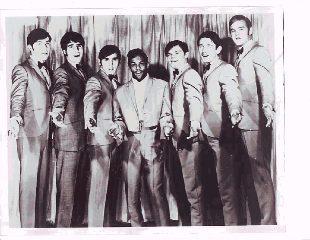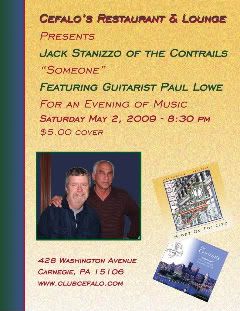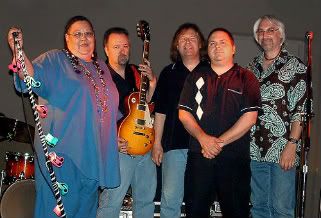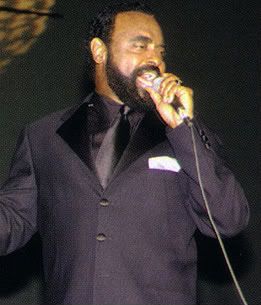
The Electrons of the late 1960's, from Richie Merritt's collection
One of the hot Pittsburgh songs of 1967-68 was "It Ain't No Big Thing," a midtempo soul tune done by the Electrons.
The song was originally done as a beach music tune by the Radiants. It would eventually be covered by 22 different artists, with better known versions done by the Tempests and Jimmie James & the Vagabonds.
The Electrons were seniors from Penn Hills High when they recorded the song in 1967 at Gateway Studios (above the National Record Mart store on Forbes Avenue near Market Square) on their own Shock Label (#289), b/w Wilson Pickett's soul shaker "In The Midnight Hour."
The Electron lineup consisted of former Fi-Dels lead singer Steve Sopko, drummer Cliff Abromats, rhythm guitarist Jimmy Widman, bass guitarist Jim Blinkhorn, Reed Donelli on brass, and lead guitarist and keyboardist Mike Colaizzi.
Abromats founded the band, and kept the business a family affair - his mom and dad (a former WAMO jock) were the de facto managers.
The song was a big thing in the Pittsburgh region - it was a Top Ten tune on WAMO, and made KDKA's Top Twenty - and created vibes in some other eastern and midwest markets. "It Ain't No Big Thing" moved enough wax locally that the Date Label (#2-1575), Columbia Record's soul subsidiary that included Peaches and Herb on its roster, picked it and the band up later in the year.
It was strong enough in the local market to keep the Electrons in business for awhile. They did the Tri-State club and hop circuit, and were regulars on Terry Lee's TV dance show "Come Alive."
And they had to work the circuit hard. The group found their contract with Date was more of a burden than blessing; the label made no effort to promote them or cut any more wax. As soon as the deal was done, they went back to the recording studio.
They put out another 45, "Turn On Your Love Light" b/w "I Who Have Nothing" (Shock #290) in the fall of 1968 with Richie Merritt on lead. He had replaced Sopko, who had left the band in the spring. (A Donora native, Merritt sang for the Mon Valley acts El Qunitones and The Dragons). But "Love Light" never took off the way "Big Thing" did.
"It Ain't No Big Thing" to this day is a popular slab of vinyl in Europe, where the Northern Soul collectors still argue over who turned out the best version.
The Electrons played the region until 1970, when the gang broke up and drifted off to college and the real world. But a couple of the members carried on in the business.
Sopko, now performing as Steve Tori, joined the Exceptions after he left the Electrons, which evolved into an eight-piece show band. He spent three years with them, and then switched gears and formed a trio that played the clubs.
After another three year stint, he went solo. Tori performs in the Pittsburgh and the near Tri-State, taking his act to clubs, restaurants, private functions, and parties. He also does gospel music, singing in area churches.
Richie Merritt opened a night club following the Electrons break-up, but carved out a sweet career on the stage instead of behind it. He sang with High Society, The Vibrators, The Laurels and The Memories.
Then, in 1993, Merritt became the lead tenor for The Clovers and was inducted into the Vocal Group Hall of Fame in Sharon with them in 2002.
They dissolved shortly after, and he joined the Marcels in 2003, with whom he still performs nationally on occasion. Now he's based near Tampa, and does southland R&B gigs both as a solo artist and with his backup group, the Gems.
He also wrote and performed "Where Did I Go Wrong" (RAM Records), a song that made the Top 10 in the United Kingdom in 1990. It's on the self-released 1998 CD "Then And Now". Merritt released a CD collection of crossover hits in 2005, titled "Now."
(Old Mon is grateful to Sonny Derdock of the Penn Hills People website for his help in uncovering the Electrons info, Audrey Monaco Danovich, who provided us with the Electrons players, Mike Colaizzi, and Richie Merritt for his help. Without their kind assistance, there'd be no post. Thanks, guys, we appreciate it.)
Electrons - "Ain't No Big Thing"
And here's the B-Side, "In The Midnight Hour"


